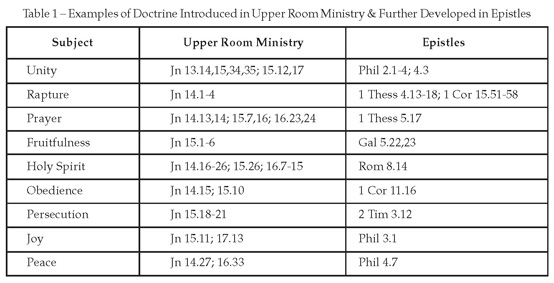Preface
Although "every scripture is divinely inspired, and profitable" (2 Tim 3.16, JND), not every Scripture applies with equal force to the Christian believer. Correct Biblical exposition requires that every passage be examined literally, and in its context. This includes noting the specific time period to which it applies (e.g. church era, tribulation, or millennium), the people for whom it was primarily intended (e.g. Israel or the Church), and significant immediately surrounding events. Once this vital initial step of interpretation has been taken, principles can be extracted, and practically applied to Christians. However, failure to interpret the Bible first of all, and instead jump headlong into application, can throw the whole realm of Biblical understanding into utter confusion.
Following Judas’ departure, the Lord Jesus opened His heart to the remaining eleven disciples. Great changes were soon to take place: Judas would betray the Lord, Peter deny Him, and all the disciples abandon Him. He was to be crucified, buried, rise again, return to heaven, and send the Holy Spirit. Therefore, the upper room ministry aimed at preparing the disciples, who had up till this point enjoyed Christ’s immediate presence, for His departure, and the commencement of something completely new in God’s programme: the church. Uniquely, the listening disciples were simultaneously apostles and representatives of the future church of which they were to be foundational members (Eph 2.20). Certain aspects of this body of teaching could only apply to them as apostles. For example:
"He that believeth on me, the works that I do shall he do also" (Jn 14.12) initially referred to miraculous powers which substantiated the divine origin of their message (Heb 2.4).
"He (the Holy Spirit) shall teach you all things, and bring all things to your remembrance, whatsoever I have said unto you" (14 26).
However, the greater part of it was instructive to the disciples as representatives of the church, and so acts as an introduction to pure church truth, forming the seed plot for New Testament epistle doctrine (see Table 1). The great joy of studying this discourse, a foundation for all Christian life and service, is that its interpretation and application are generally speaking the same process. Practically everything contained in it is to be literally applied to the Christian Church.
Period
Numerous time references, stretching from eternity (Jn 17.5) to eternity (Jn 17.24), are clearly spelled out, or alluded to, in the text (Table 2). The Saviour, having "been so long time" (Jn 14.9) with the disciples, and now knowing "that his hour was come that he should depart out of this world unto the Father" (Jn 13.1), instructed them concerning their future, and the future of those who would believe on Him "through their word" (17.20). Following the Lord’s death, resurrection, ascension, and Pentecost, a new age would dawn in which believers, personally and permanently indwelt by the Holy Spirit, would constitute the church, which is His body. It is to this unique period in the world’s history that the upper room ministry primarily applies.
To be continued.











